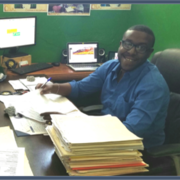
Ralph B. Charles is the STD/TB/HIV Program Manager for Zanmi Lasante.
What is your current position?
I manage the TB/HIV program at a Health Center called Centre Medical Dumarsais Estimé localized in Verrettes, Haiti. We have an active pool of around 1800 patients on ART. My role is to ensure that all aspects (administrative, strategic and clinical) of the program are well organized and working smoothly in order to achieve the different targets set every year.
What is something that you wish to accomplish in your career or any goals that you have?
I have many goals: personal goals, private goals, and public health goals. I work in two sectors — I work in the public sector and in the private sector. I also work on weekends at my family’s hospital, built by my parents built in my father’s home city in Haiti.
The best way to summarize my goals in the public sector is to decentralize the health system in Haiti. Right now, it is centralized in Port-au-Prince, which is the capital; that’s where all the doctors are. If you need advice from a specialist, you have to travel to Port-au-Prince 99% of the time...I want to work towards decentralizing.
In the private sector, my goals are more focused on my hometown, Léogâne, which is located 45 kilometers from Port-au-Prince. I’m trying to find a way to take my parents’ lifework several steps further, with a hospital in Léogâne that will provide the highest quality care for at least the four basic services: pediatrics, internal medicine, surgery and OBGYN. This also fits into my decentralization goals because it would provide access to quality health care, for the people from the south of the country and would reduce the need to travel to Port-au-Prince.
What is the biggest challenge you face in your current position?
The biggest challenge was actually captured in GHP555 in Dr. Lisa Hirschhorn’s lecture in the slide where the little boy is pushing on a big elephant. Change does not always feel welcome in Haiti, and that is my main challenge every day in life. People are comfortable with routine and often are hesitant to improve systems.
When you were applying to GHDI, what were you hoping to get out of this program?
I am thinking about doing the Master’s program in Public Health so I thought GHDI would help tell whether the Master’s program is the path for me and give me a first-hand idea of what it would be like.
What impact do you think GHDI will have on your career?
It has already impacted my career. I have a deputy assistant that is replacing me at work during my time at GHDI. Every day when I get out of class, I call or text her to share with her the main takeaways from that class. One of the things that GHDI has helped me realize is that my organization has so much unused data. When I return to Haiti, I will get a researcher to begin studying the data and I will conduct more data analysis in order to have a better way to make decisions. I like to innovate and make changes, but I often don’t have the proof I need to explain or justify these changes. Upon going back, with the little experience I’m getting here, even for 3 weeks, I already plan to change my approach. Before making a change, I will gather all the data that I need to prove the change is needed. I hope that is going to be easier for me. I used to do it randomly: “This is not working and we’re going to change it.” But, now I will prove its not working first.
What are you most proud of in your career?
I’ve only been working in healthcare for five years. I was the assistant manager of a different site before I got promoted to manager of the program that I’m at right now. I learned a lot in the first 2 years from my superiors. Then I got to Verrettes and saw their system was working, but it was chaotic, with no documentation. When I came, I made some changes to improve the system. We now document everything we do. For example, the way they used to check on patients lost to follow up was they just randomly went to the EMR and saw X patients needed tracking because they missed their last clinic meetings, and this is a real big part of the program in Haiti, keeping them in treatment.
What I did was add a little bit of structure and documentation to this whole process, they have taken my model and used it in all the sites of Zanmi Lasante. I’m proud of that.
What advice would you give to someone just starting out in healthcare in your country?
Healthcare in Haiti is a war zone. You need to gear up. You have to want it. You have to really care for the job that you’re doing because it’s not going to be easy. I’ll always joke with my friends, if we can do medicine in Haiti then we can do it anywhere. We practically do military medicine with very limited resources. My first piece of advice is you need to adapt. Secondly, you need to do your best to leave your mark, however little it is. Just try to change something. And that little change will probably lead to a bigger one from somebody else, and then snowball. Though, you have to be patient. Change will take time.